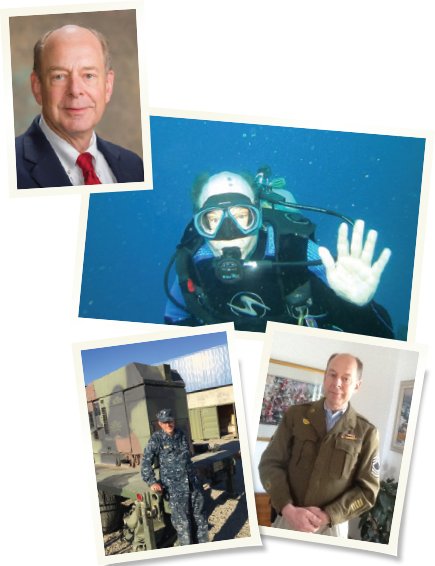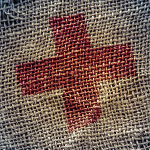In 2010, Thomas Bartow, MD, FACP, finally ran out of excuses.
Ever since high school, he had wanted to join the military. But too many things got in the way—like attending medical school at State University of New York at Stony Brook.
After graduation in 1980, he performed his residency in internal medicine at Rush-Presbyterian-St. Luke’s Medical Center in Chicago from 1980–83. He served on the school’s faculty as an internist for the next two years and completed his rheumatology fellowship at Johns Hopkins School of Medicine, Baltimore, between 1985 and 1990. Then he moved to Wisconsin to join the Marshfield Clinic as a rheumatologist, where he has remained ever since.
While pursuing his medical education and career, he married Rebecca, an ophthalmologist, and together, they raised five children. When his kids grew older and moved out on their own, his excuses came to an abrupt halt. His desire to join the military was as strong as ever. So in 2010, when he was 55 years old, Dr. Bartow joined the U.S. Navy Reserve as a Lieutenant Commander and has since been promoted to the rank of Commander.
Dr. Bartow says his experiences in military medicine have been rewarding and “amazingly fun.” More importantly, he says, volunteering has allowed him to fulfill a lifelong passion of serving his country.
“Usually, the military doesn’t take people [older than] 42,” says Dr. Bartow. “They don’t want old geezers; however, they make an exception for doctors, because they’re hard to get.”
Two-Way Street

Dr. Bartow enjoys diving in his spare time, particularly in warm locations.
Commander Bartow with his “favorite generator” in Dublin, Calif., in July 2017.
Commander Bartow plans to continue to apply for an age waiver.
For nearly eight years, Dr. Bartow has spent one weekend each month training with other doctors, corpsmen and allied health staff at the Great Lakes Naval Station in Chicago, a five-hour drive from his home. Another two weeks each year is spent on active duty at Naval bases around the country.
He explains that the Navy provides medical and chaplain support to the U.S. Marine Corps, which is part of the Department of the Navy, although no Marine likes to admit it. Most of his assignments between 2011 and 2016 involved working with a Marine Corps unit based at Great Lakes, and the remainder was with the Navy at the same base.
“Our main mission was to maintain medical readiness for the reservists,” Dr. Bartow says, adding that during this time he developed a solid understanding of occupational medicine, especially how people’s medical conditions affect their daily functional status. “Part of our weekend service was giving everyone an annual health assessment—everyone from the chief of Naval Operations to the newest recruit—and monitoring their health status.”
This summer, he spent two weeks at Parks Reserve Forces Training Area, also called Camp Parks, which is a U.S. Army facility in Dublin, Calif. The mobilization and training center is predominantly used by U.S. Army Reserve personnel in case of war or natural disaster.
“We set up a 32-bed acute care hospital,” says Dr. Bartow. “We erected the tents and set everything up from scratch to simulate what we would do in the field to support the Marine Corps. We would operate like a MASH (mobile Army surgical hospital) unit.”
For nearly eight years, Dr. Bartow has spent one weekend each month training with other doctors, corpsmen & allied health staff at the Great Lakes Naval Station in Chicago, a five-hour drive from his home.
As it turned out, he was also the person most comfortable with handling electrical power distribution and ended up being in charge of the generators.
His civilian employer has also benefited from his military experiences. Instead of blindly testing patients for tuberculosis, especially those taking biologics, Marshfield Clinic is in the process of rolling out a military screening questionnaire to monitor patients’ risks for the disease. If positive indicators are revealed, then patients are tested.
Dr. Bartow served as a department chair of rheumatology at Marshfield, but says, “I learned more from being a leader in the military about how to function in a civilian world. I learned how to be a better, more effective team leader and facilitator by analyzing things, getting buy-in from everyone involved and making sure everyone is on board.”
He says his experiences as a rheumatologist have also proved very useful for the military, because many reservist sick calls or complaints involve musculoskeletal problems or injuries.
Off-Duty Fun
When he’s not working at Marshfield or engaged in military training, Dr. Bartow sings in the church choir and performs in community concerts twice a year. Several times a month, he and his wife also go scuba diving in local lakes. They take dive trips several times a year. They recently returned from a dive trip to Iceland and Greenland, which reinforced their preference for the warm waters of the Caribbean.
With little spare time, Dr. Bartow still looks forward to his weekend military drills. He says many of the people he deals with are young, smart and motivated. In some respects, he says it’s like working with his own children, which is a wonderful experience.
Some of his colleagues, friends and family members believe his joining the Navy so late in life was symptomatic of a mid-life crisis. With a nod to that opinion, Dr. Bartow says, “Some men my age would have a bought a Miata.” However, he continues, “my father and father-in-law were both WWII veterans. I felt I hadn’t done my part. I felt an obligation to do service.”
For the foreseeable future, he’ll continue requesting the military to waive its age requirements, enabling him to continue working with many of the people he considers his extended family.
Dr. Bartow discusses the benefits of serving in the military reserves.
Carol Patton is a freelance writer based in Las Vegas.


